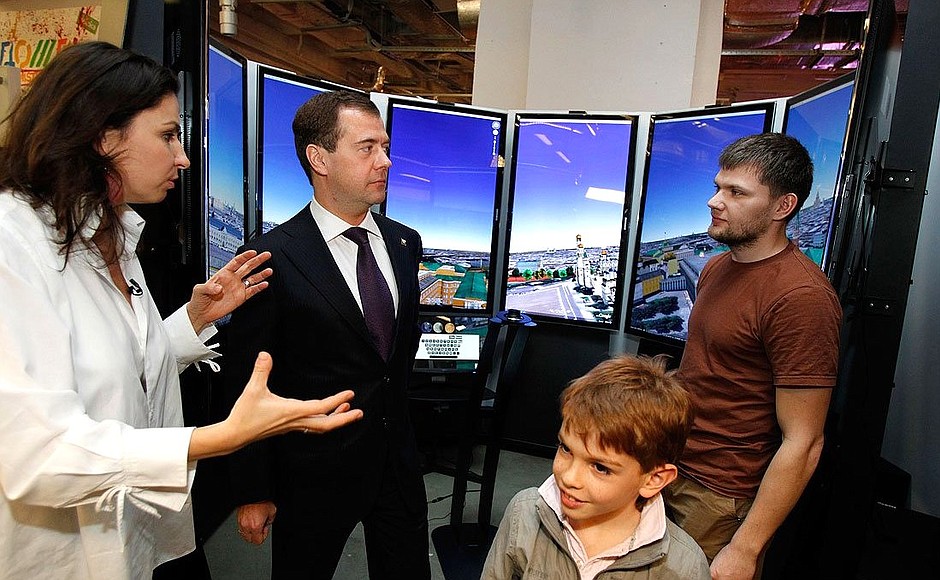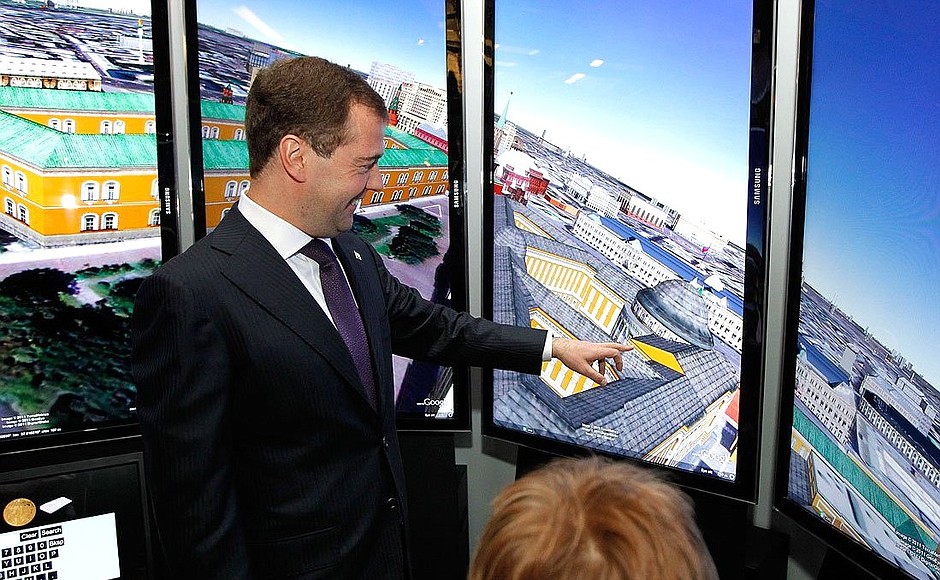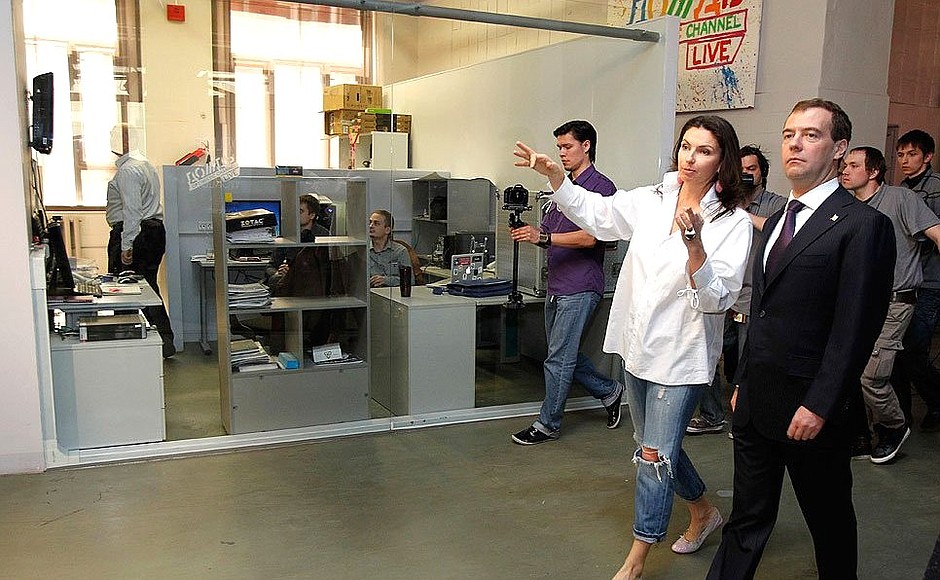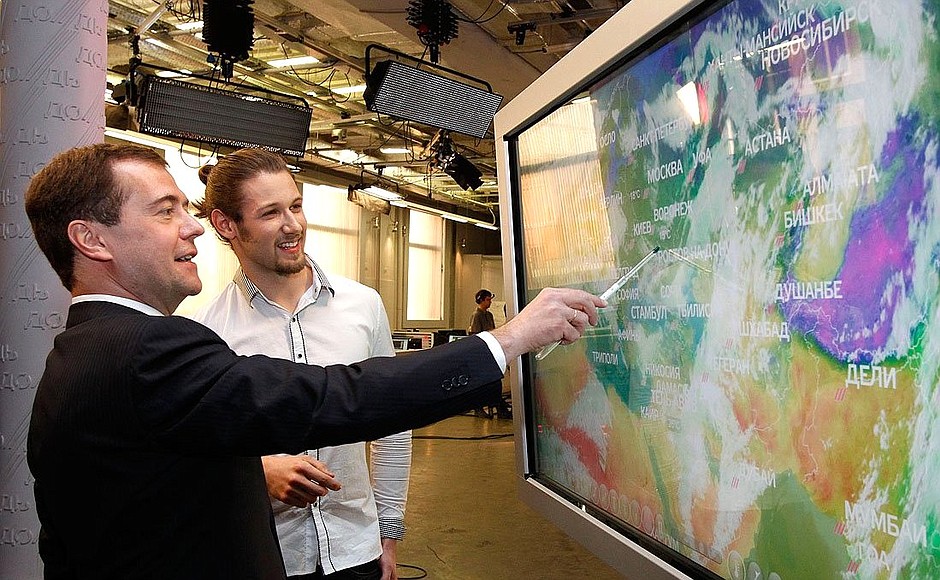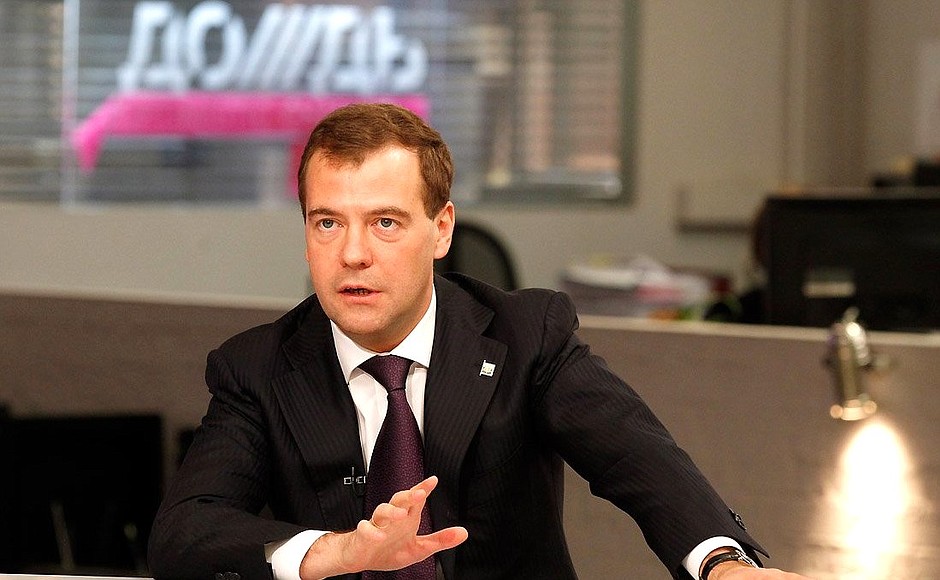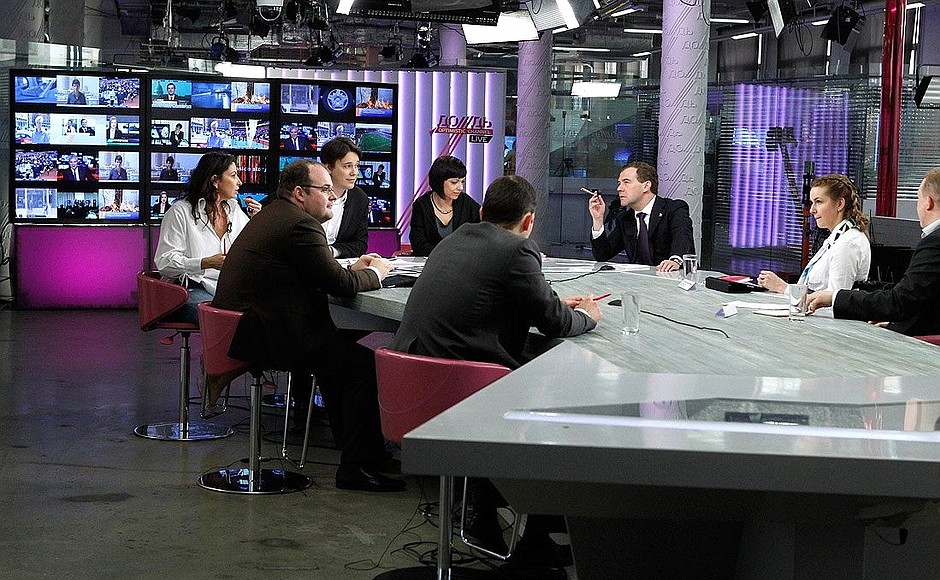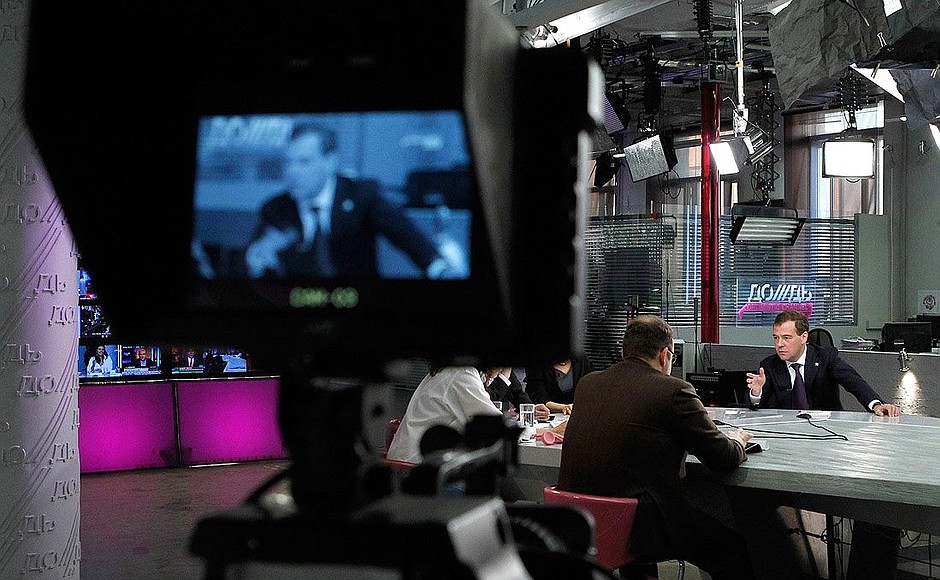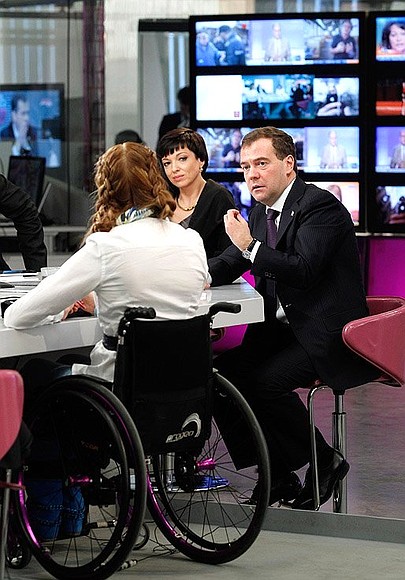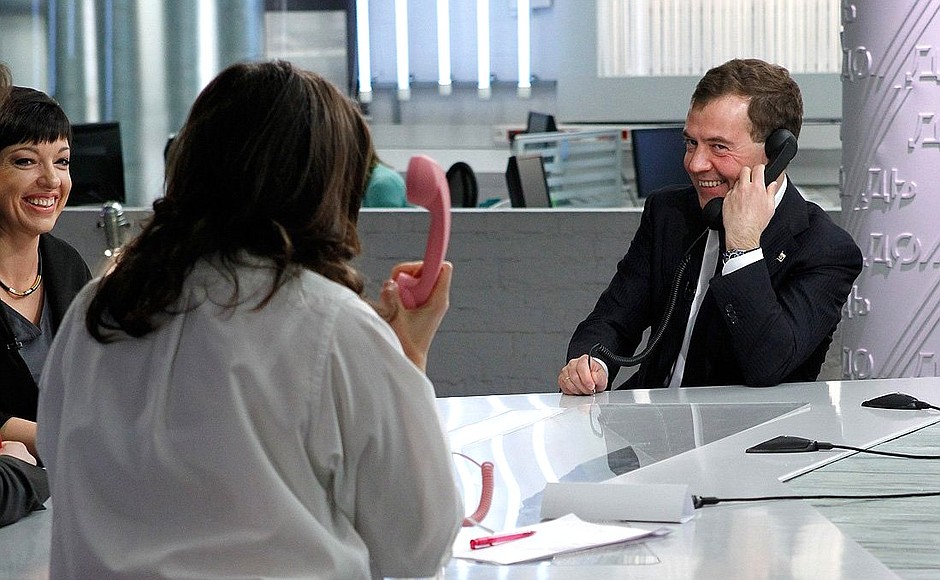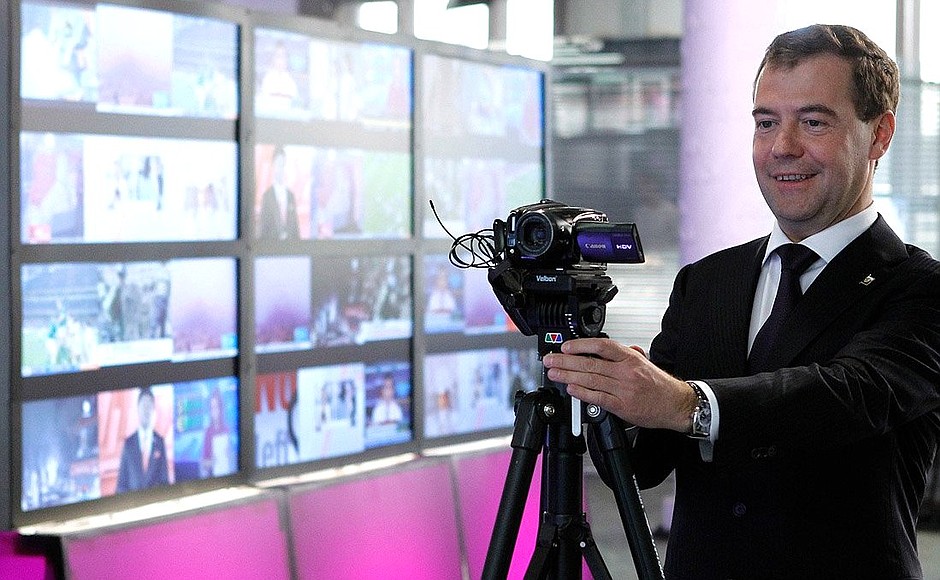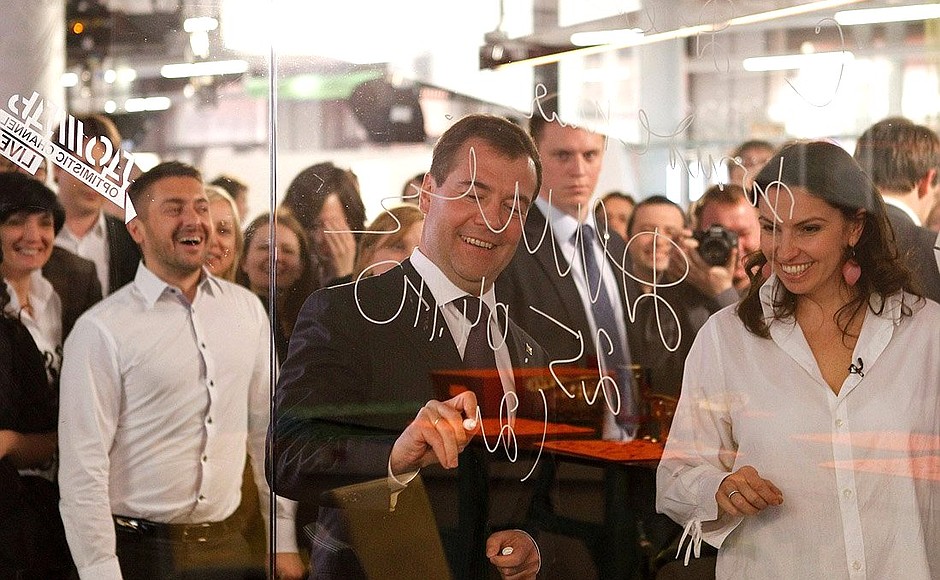Conversation at Dozhd (Rain) television channel studio
Tatiana Arno: On April 16, an anti-corruption protest was organised by youth groups on Academician Sakharov Avenue in Moscow. After that, a video appeared online showing young participants in the protest saying they do not know who Sakharov was or what he did for the global community. Don’t you think that youth movements, the way they are now, are ineffectual?
President of Russia Dmitry Medvedev: No, I do not think so. I don’t, because any public movement and any public association in general, reflects the maturity of the civic society, therefore we have the civic society that we have, with its various distortions and problems, the one structured in its own way. What are its components? They are many and include these youth movements of which some are valuable, while others, possibly, less so. But to me, it seems wrong to label them all at the outset as useless, for the very reason that they represent certain ideas and as long as these ideas are not in conflict with the public order and do not breach any laws, I think they have every right to exist.
Furthermore, I generally believe that public associations of youth or any others social groups do not necessarily pursue specific practical purposes and may sometimes be social clubs based on shared interests. Why do they have to serve some kind of practical goal? Perhaps they enjoy being together, meeting, socialising.
True, there are lofty aims and, probably, ambitious challenges, but there should be adequate social mechanisms to handle these challenges. Is it up to public associations or youth groups to meet these challenges? I am not sure, it may be so in some cases, but certainly not in others.
You mentioned anti-corruption rally. To be honest, I do not know what was the meeting at Academician Sakharov Avenue in Moscow about. It’s too bad that the youngsters there don’t know who Andrei Sakharov was, but on the other hand, they do know what corruption is. I see the fact that they are getting involved in addressing this problem as a good thing, because they have their own position. You know, in this regard, as usual, young people take the toughest attitudes, and at the same time, they are the most active. The comments I receive, through my blog and Twitter for example, are mainly coming from young people, and their positions are entirely well-defined – sometimes too radical and harsh, but nevertheless, they express them openly. I believe that public associations must be seen as representation of our social pattern.
You know what I particularly like, as a fan of new technologies? The fact that here, you have a synergy of all these new technologies. No doubt, what you just showed me and the technological processes involved, all look entirely different from what I usually see when I visit our national TV channels.
When I was working in the Presidential Executive Office, many colleagues did not understand what I meant when saying that ‘We absolutely fail to pay adequate attention to the Internet which has not just become a major factor in social life, but moreover, it is something most young people see as part of their future. Mark my words, in a few years, a significant proportion of our youth will no longer watch regular television.’ And not because they hate it, or feel that it is absolutely authoritarian and organised by the government, although some do feel that way; but for simple, pragmatic reasons, because it is more convenient to just watch it on an iPad or on the computer. Not long ago, some three or four years ago, I actually stopped watching news programmes on television myself. Why? Because it is more convenient to watch them on the Internet, where I can do several things at once: I can review documents, I can talk to someone on the phone, and at the same time, I can watch the news, recorded or online. It is very convenient, and that is precisely what a significant proportion of our people are doing.
Natalia Sindeyeva: This is a very important issue, because the Internet is one hundred percent the direction of the future. The advertising budgets intended for the Internet still cannot cover our expenditures, and right now, this is our major problem, because on the one hand, we are expanding the advertising market, but on the other hand, online advertising money is only going toward the major resources, like Mail.ru and Yandex.ru.
Dmitry Medvedev: And nevertheless, look at how much the biggest international Internet brands and online businesses are worth now, how much social networks are worth. If compared to the value of television channels, they have already surpassed them. There is a clear trend.
I understand your laments that your situation is nowhere near there yet, that advertising money in the Russian Internet is not very large and therefore no match to regular television. Still, our regular television channels are staffed by smart, well-educated people looking toward the future. They understand that without Internet they do not have any prospects. Just a few years ago, they didn’t even have full-fledged websites, but now, they all have them, and they understand that they can’t do anything without them.
Yevgenia Voskoboynikova: We will soon be celebrating our one-year anniversary, and as it happens, I was one of Dozhd’s first employees. But you could say I was lucky, because I think here in Russia, it is very difficult for people with disabilities to get a good job.
Dmitry Medvedev: You have raised a complicated topic. I will tell you directly and honestly, especially since you know this very well for yourself, that unfortunately, we have never had a culture of integrating disabled people into regular life. We didn’t notice these people, and in the USSR even respective statistics was concealed. The concept was, everyone was able-bodied, and if somebody was not, that person was seen as non-existent. I have to say frankly that this attitude has remained within the mentality of many people. It is a kind of stereotype, but one that is now gradually being overcome. As you know for yourself, new building standards are being used in large cities – and even smaller ones, as well – so that disabled individuals can enter and exit normally in their wheelchairs.
Yevgenia Voskoboynikova: I can confirm that this is true in Moscow.
Dmitry Medvedev: Moscow is the leader in this sense. But other places are advancing as well.
As for finding jobs, this is an area where we need to proceed in the same way people are proceeding throughout the world, and not shy away from giving certain incentives and preferences to employers who hire people with disabilities. But naturally, this must be done sensibly. Because as you yourselves understand, there are many individuals who are witty, clever, and smart. And if, for example, we widely open that door, then no doubt a murky flow of tricksters will rush there bringing absolute opposite results to what was intended. Still, overall, there is to be a system of incentives for employers, so that this would not be a good luck, as you describe your case, but rather, a standard, typical situation, the same way it works throughout the world.
Another important aspect here is education. We have almost no inclusive schools where disabled children study together with children without disabilities. As a result, they are divided, and children with disabilities have a kind of fear; they are afraid to socialise with non-disabled children. At the same time, able-bodied children have a difficult time socialising with disabled children, because they do not know how to behave, etc. This is just not right; they should be together. Incidentally, there is some good experience with that in Moscow, but this should happen throughout the entire country. In general, we have many various social programmes, and I imagine that you probably know some of them. The programmes are good, but if we’re being honest, this is partially a mental issue. I do not see anything exceedingly complicated here, but it will take some time.
Yevgenia Voskoboynikova: In other words, we are to raise a new generation.
Dmitry Medvedev: We must raise a new generation of disabled individuals to make them able-bodied members of our society.
Natalia Sindeyeva: Mr President, I want to add something. As an employer, I had simply never encountered this problem, because it’s true that we do not often see disabled people, they are not out on the streets, and we do not meet them.
Dmitry Medvedev: Because that’s the way everything works here, it’s hard for them to even enter a restaurant.
Natalia Sindeyeva: Disabled people in Russia are just not adapted socially. Besides, there is a negligence by society.
We are now planning a series of videos where we want to talk about integrating disabled individuals into society and show people like Yevgenia Voskoboynikova who work, who are integrated into normal working life and conditions.
Dmitry Medvedev: Successful people.
Natalia Sindeyeva: Yes, successful people. Such programmes should be supported on a government level. In Europe and America in the 1960s and 1970s, as we learned when making our videos, there were numerous TV advertisements, billboards, publications in the press, etc., that simply showed and emphasised that there are disabled people among us. And this gave an unbelievable push toward helping these individuals adapt.
Dmitry Medvedev: I agree. By the way, there was no Internet in the 1960s in America or elsewhere, and now, this should also be done via the web, because opportunities to reach people are much higher. Videos are important. But overall, this simply must be one of the serious topics up on the web, including via online television.
Natalia Sindeyeva: We are working on it.
We have five more minutes.
Dmitry Mevedev: Let’s talk about modernisation before I leave for the ceremony of presenting state decorations.
Remark: Yes, let’s discuss modernisation.
Maria Makeyeva: Modernisation is an important issue so we cannot let you go without asking about it. We were just watching the meeting of the Commission for Modernisation and Technological Development of Russia’s Economy where the subject was reviewed thoroughly.
Dmitry Medvedev: You didn’t fall asleep watching it?
Maria Makeyeva: No, we were actively discussing it on occasion.
Dmitry MEDVEDEV: Good. You know, some meeting participants apparently needed stimulants to wake up.
Remark: We saw it.
Maria Makeyeva: Further to this topic: the brain drain problem. This was mentioned many times, although optimistically – the idea that it can be overcome.
In principle, we must all be aware, and I am certain that you are aware that thousands of young, educated people in Russia are thinking about emigrating, to various degrees of seriousness; many are thinking entirely seriously about it.
Remark: After the incident with Eugene Kaspersky’s [owner of Kaspersky Lab] son who was kidnapped [on April 19, 2011], these intentions may only get stronger among the creative class. After all, Kaspersky is, in a sense, an icon of our innovations.
Maria Makeyeva: Our question is, what would you tell young people while online on our channel, to convince them otherwise?
Dmitry Medvedev: You know, I think it is impossible to convince anyone online. After all, I am a realistic politician, not a schemer or a Kremlin dreamer, as people sometimes perceive.
Maria Makeyeva: Sometimes, words are very important.
Dmitry Medvedev: Words can be important, certainly. You know what I will say. First of all, I will say something that may seem subversive: there is nothing reprehensible in thinking about leaving. People in other nations think about it as well. Every modern adult individual builds his or her own career. The question is, why do they want to leave, and are they planning to return? This problem does exist. True, some of our educated, intelligent young people consider possibilities of leaving forever – or so it seems in the beginning – and building their lives, careers, and successes abroad. An enormous number of other people – for example, Chinese citizens – think about leaving, studying, and then returning to their home country. The same happens in other states. So this matter also involves the priorities of values.
Moreover, a great deal depends on the individual. If someone simply comes along and says, ‘You know, I do not see opportunities here to develop my talents, I cannot do anything, so I’m going over there, where they will give me a grant, where I will have opportunities to work in a laboratory, and that’s normal. Here, I cannot actualise myself’, then that is his or her right, and I do not judge that person. But this speaks about certain inner convictions. Ultimately, that is up to each person to decide. When I was finishing my university and beginning my postgraduate studies, there was an enormous stream of people going abroad. So what? Many of them returned and may are now working in Russia, although others stayed. That’s their business. We cannot have Soviet attitudes about it. I’m not going to say, ‘Tomorrow, I will sign an executive order to create a system of incentive measures for a certain number of people; then they won’t leave, they will stay’. That will never happen, no President would ever do that, it is impossible. But the authorities must work on ensuring that our young people, our young entrepreneurs and innovators, have normal working conditions. That is precisely why I am heading the Skolkovo Foundation – just to focus public attention on this matter. This isn’t generally presidential work, but the attention is of prime importance.
Some of you here participated in the meeting [of the Commission for Modernisation and Technological Development of Russia’s Economy] today. Tell me, what would be the incentive that would help a person decide to return to Russia from abroad?
Vladimir KANIN: In my company there are three people working who live abroad and are no longer Russian citizens, though they are Russians, but one now lives in Sweden, one in Belgium, and one in Britain. Two of them have started coming here a lot more often, and this shows that they find it comfortable working here, working on our project. I don’t know if they will actually make the move back to Russia or not, but this is not issue anyway. Remember that Sitkovsky said at the Commission meeting that where he works in the world (in the USA and so on) no one has even come close to grants and innovative investment. True, people leave if they can manage to arrange it all. I myself was thinking about moving there, to Silicon Valley, in the hope of getting some investment, because I’d had more than my share of knocks here, but just a month before I planned to leave the Skolkovo project began, and this gave us just the opportunity we needed to get our project moving. But people will move here if we can offer them the infrastructure they need, and comfortable conditions for work and life. These are simple and obvious things.
Natalia SINDEYEVA: You know, we’ve been seeing a trend start to emerge. Just in a few days, right after the May Day holidays, a project will begin at Skolkovo to select startups, with the possibility of obtaining grants and so on. It was a revelation for me that there are so many companies – business angels – working with startup ventures now. This is real new trend, and these companies are sprouting up all over the place, because the investors are out there.
Remark: It’s becoming popular and trendy.
Dmitry MEDVEDEV: Of course.
Natalia SINDEYEVA: Because there’s investment. It’s true that it’s becoming a popular and fashionable thing to do. I can see this in my own case.
Remark: If we have success stories, it will become even more popular.
Dmitry MEDVEDEV: We should cover these stories. In this respect you have a very important mission to play.
Natalia SINDEYEVA: I agree absolutely.
Dmitry MEDVEDEV: This is something we need to talk about. There will always be sceptics of course, people who say to us that we will never succeed, that people will continue to leave the country as before, and recall various realities of Soviet life that have nothing to do with present-day Russia. And so we must keep doing what we’re doing now, only we need to work even harder, put in the effort every single day, and we will see the results. Skolkovo project will be a success, and we will be able to spread and develop the ideas at its foundation. After all, if others can, why should we not succeed too?
Mikhail Zygar: Mr President, we have very little time left, but our viewers would not forgive us if we fail to ask you the question that everyone is waiting for us to put. It’s an obvious question, about the 2012 election, because the election concerns business’ future too, and the people behind the startups are also building their plans around future prospects. Of course, we realise that a clear answer to this question is unlikely…
Dmitry MEDVEDEV: … unlikely to be forthcoming right now.
Mikhail Zygar: Yes, you probably won’t give us a clear answer.
Dmitry MEDVEDEV: You just never know. Go ahead with your question and we’ll see.
Mikhail Zygar: Let me reformulate it a little. Sooner or later, we all know that you leave the president’s job, whether in 2012, or in 2018.
Dmitry MEDVEDEV: Yes, you can bet on this 100 percent.
Mikhail Zygar: Have you thought about what you would like to do after this, perhaps go into innovative business of some kind, or stay in government work?
Dmitry MEDVEDEV: Mikhail, that’s an excellent question you’ve asked. People always ask me if I am going to run for office again or not, and if not, then what role do I see for myself in government or civil service? But no one asks the more human question of what kind of future role do I see for myself in general, and what I would like to do after my time in my current job.
Of course, it’s not the easiest thing to find a new role and start a new life after this job.
Mikhail Zygar: It’s possible to imagine Bush or Obama after leaving office, but it’s practically impossible to picture Medvedev or Putin after leaving power.
Dmitry Medvedev: Yes, all the more so that earlier periods showed us time and again that life in the good sense ends when someone leaves power here. Probably the only exception in this respect was Boris Yeltsin.
Remark: But he was 70, and so he retired.
Dmitry MEDVEDEV: Yes, he was already not a young man, true, but it seems to me he lived an interesting life after leaving office, travelled a lot, read books, and in this sense he was lucky.
As for my own plans, to be honest, I am sure that I will be able to find interesting work to do, aside from the various hobbies that I, like so many others, have, and which I will also continue to pursue too, of course.
Overall, when this part of my career ends, when this time of state office ends, I want my life to remain active. I’m extremely interested in all kinds of new technology, including what I see here at your company. I don’t know, perhaps…
Natalia SINDEYEVA: Maybe teaching?
Dmitry MEDVEDEV: Yes, absolutely right. At Skolkovo anyway, that’s for sure. If everything is up and working there normally by that time, I would like to teach there, and at other places too, because it seems to me that for any politician who has been at the head of the country this is simply a must, simply a duty to share his experience, both positive and negative, with others at home and abroad. This is something that can be useful to many, many people.
Natalia SINDEYEVA: Of course you are to share this kind of experience.
Dmitry MEDVEDEV: Yes, this is certainly something interesting.
Also, coming back to new technology, in the future I would like to take part, through Skolkovo Innovation Centre and other institutes, in the work to promote and develop these technologies, I don’t know in what exact capacity yet, as a business angel, or as one of the people helping to develop Skolkovo, but this is certainly something of real interest.
I’d also like to get involved in the media, if I can, because it’s an interesting area too. By that time, your own TV business will have grown, and you can invite me to come and comment on all the big political news.
Natalia SINDEYEVA: We’re being told our time is up. I’ve got a little present for you. I know you like all sorts of gadgets, and I’ve got this, which my friend brought me.
Dmitry Medvedev: Wow, it’s a phone receiver you can stick in an iPhone, it seems, or is it for an iPad?
Natalia SINDEYEVA: You can put it in an iPhone, or an iPad. I want to give you one as a gift.
Dmitry MEDVEDEV: It’s the meeting of old and new technology – wonderful! I don’t have anything like this.
Congratulations on your upcoming anniversary.
Remark: Thank you.
Dmitry MEDVEDEV: This is a great place you have here, and I’ve really enjoyed this visit. I never saw a TV channel like this before.
Natalia Sindeyeva: Come and visit us again.
